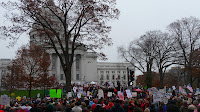 For the first time in my 25 some years of regular visits to the U.S. I have finally seen a massive demonstration in the States. It was not a Tea Party demonstration (those are essentially over anyway, and probably no one will remember them except for the fact the GOP has adopted their motto). It was not even one of the “Occupy movements” that are going on across the country these days. It was in too small a city for any of those.
For the first time in my 25 some years of regular visits to the U.S. I have finally seen a massive demonstration in the States. It was not a Tea Party demonstration (those are essentially over anyway, and probably no one will remember them except for the fact the GOP has adopted their motto). It was not even one of the “Occupy movements” that are going on across the country these days. It was in too small a city for any of those. Well, Madison, Wisconsin may be small but it has a history of protests going back to the 60s. Not only is it the state capital; it is also a college town where students are known to be very active with a campus that gained a reputation for one of the most radical campuses in the nation during the Vietnam war (here).
Some historians believe we may be witnessing the biggest surge in campus activism since the 60s which is in part inspired by the Occupy movement (here). This may indeed be the beginning of a new era if the economic situation does not improve and the financial and banking systems remain unaccountable. Not only, is there is a lot of anger and hopelessness out there, but if the national consensus around the belief in the American Dream continues to erode, people will start revolting somehow. (The "We are the 99%" slogan used in the protest to refer to the discrepancies in income between the elite and the remaining of the population can only undermine the narrative of the American Dream).
The protest last week gathered about 30,000 people, and not just students. It may be small by comparison to French (and Parisian) protests, but it was impressive enough. Until then, I had only witnessed a few small scale protests, something like a dozen of people picketing and protesting, with signs walking in circle. I have always found this form of picketing a bit strange, not quite sure how efficient it might be.
Essentially though, the protest in Madison consisted of the same thing but on a larger scale. The main differences with European demonstration is that people held individual signs and not large banners as in Europe (see picture on the left), and the protest did not go from point A to point B, as it is typically done in Europe, but it consisted in walking in circle around the capitol.
Unlike the “Occupy movement”, they had a very specific demand: the recall of Governor ScottWalker. A “recall” is a legal procedure by which voters can remove an elected official from office. In order for new elections to take place though, they need enough signatures within a certain time limit.
Basically, what is at stake here is union rights. Scott Walker has taken some heat mostly from the left for trying to do away with union collective bargaining, which would essentially strip off the unions of their power to bargain with employers, mostly in the public sector. (see Mother Jones' article for more details).
 I’m not necessarily a big fan of how unions operate, either here in the U.S. or in France. They are usually seniority based, which means that advancement is not based on performance but on age and time on the job. And worse still, in the U.S. union membership can sometimes be a condition of your employment in state and government jobs. (this does not seem to be the case in the private sector).
I’m not necessarily a big fan of how unions operate, either here in the U.S. or in France. They are usually seniority based, which means that advancement is not based on performance but on age and time on the job. And worse still, in the U.S. union membership can sometimes be a condition of your employment in state and government jobs. (this does not seem to be the case in the private sector). That being said, unions are a necessary force for countervailing the power of employers and management, ensuring fairer wages, workplace safety and the enforcement of Labor laws.
Howard Zinn’s “A People’s History of the United States”is a good reminder of the necessity of unions in the past, and if history can teach us a lesson in this respect, it is likely that unions will be necessary in the future, particularly in this current economic crisis and in this political context when, for example, a popular Republican presidential candidate calls child labor laws “stupid”. So maybe instead of throwing the baby with the water, we should acknowledge what needs to be changed and aim for reform of how unions operate both in France and in the United States. Wishful thinking? Maybe this global economic crisis will offer new opportunities for change, but those may not happen without a fight of some kind.



No comments:
Post a Comment